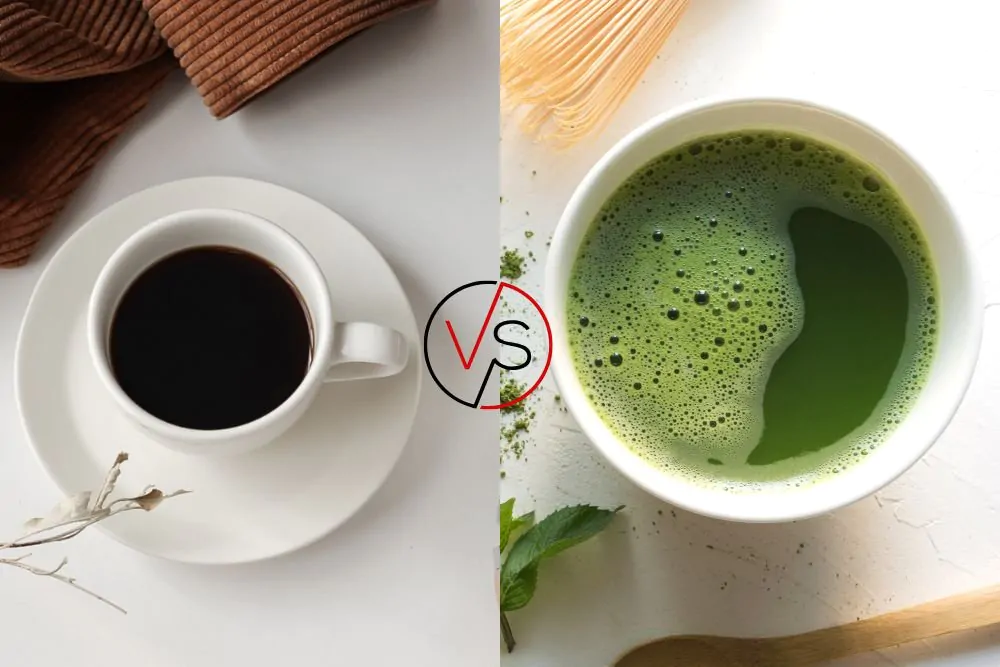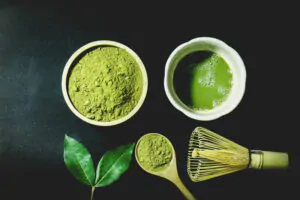More than 450 million cups of coffee are consumed on a daily basis in the US alone. Coffee is certainly popular, but another common drink is matcha.

Among the possible morning beverage choices, coffee ranks at the top of the list for many Americans.
Every year, more than 400 billion cups of coffee are consumed. In the United States alone, more than 450 million cups of coffee are consumed on a daily basis. Furthermore, about half of all adults in the United States drink coffee daily.
While coffee is popular, another common drink is matcha.
Matcha is a particular type of green tea that is made by taking young tea leaves, grinding them into a green powder, and whisking them together with hot water.
With matcha rising in popularity, which is better when looking at coffee vs matcha? In the end, coffee comes out on top; however, it is important to look at the details of the comparison closely.
An Overview of Coffee vs Matcha
Traditionally, coffee has been one of the most popular drinks in the world; however, matcha has become a popular beverage for many people as well.
Coffee has a long history and comes in numerous varieties ranging from a standard brew to mochas, macchiatos, cappuccinos, espressos, and everything in between.
In addition to helping people wake up in the morning, coffee could also help with weight loss while also preventing the development of a number of chronic health conditions.
On the other hand, matcha is a popular choice. It could help with skin complexion, weight loss, and mental acuity. Therefore, it is important to look at both the benefits and drawbacks of each drink before making a decision.
The Benefits of Coffee

Coffee is loved by countless people who depend on it to not only get them up in the morning but also for their social lives. Of course, the biggest benefit of coffee is that it contains caffeine, which can sometimes help you overcome fatigue.
Caffeine keeps people awake by blocking adenosine receptors (which would otherwise make people tired) and by increasing dopamine levels (which help people feel energized). Some of the other key benefits of drinking coffee include:
- Coffee and its caffeine has been shown to help people during their workout routines, increasing endurance.
- Coffee comes in a variety of forms, allowing everyone to tailor this beverage to meet their needs.
- Coffee has been shown to significantly reduce the risk of developing type 2 diabetes.
- Coffee has been shown to help people lose weight, targeting the body’s adipose tissue.
While these benefits are important, there are several drawbacks to drinking coffee regularly as well. These include:
- Coffee is high in caffeine, which could lead to caffeine addiction. This could also lead to caffeine withdrawal, which could include symptoms such as headaches, irritability, and emotional lability.
- Drinking coffee in the afternoon has been known to lead to insomnia.
- Coffee has also been shown to cause anxiety.
- Too much coffee can also raise the body’s cortisol levels, leading to stress.
These are a few of the key drawbacks of drinking coffee. Therefore, everyone has to weight the benefits and drawbacks of coffee carefully.
The Benefits of Matcha

Matcha green tea has become a popular alternative to coffee. There are several health benefits of matcha to keep in mind.
In addition to containing caffeine, which helps people stay awake, some of the other health benefits include:
- Matcha is packed with antioxidants, which scavenge free radicals and prevent cellular damage. This can help everyone keep their skin looking fresh and clean.
- Matcha green tea can help people burn fat and increase weight loss, making this a good part of numerous diet and exercise routines.
- Matcha can also help people improve their mental acuity, providing a much-needed memory boost, particularly to the elderly.
While these benefits are great, there are several drawbacks as well. These include:
- Matcha has a high caffeine content, which could lead to caffeine addiction. Later, caffeine withdrawal symptoms could develop as well. Common caffeine withdrawal symptoms include headaches, irritability, and emotional lability.
- Too much matcha green tea can lead to an increase in stomach acid, which might lead to acid reflux and other GI complications.
- Matcha green tea can also create an acidic environment in the mouth, which could lead to the formation of dental cavities.
While many people enjoy matcha green tea, it should be enjoyed in moderation.
The Final Word on Coffee vs Matcha
In the end, the comparison between coffee and matcha is close; however, coffee still comes out on top. In addition to being more popular, the health benefits of coffee simply outweigh the benefits and drawbacks of matcha. At the same time, the right drink for one person might not be right for someone else. Therefore, everyone should take a look at coffee and matcha, try them both, and see which one they like.
